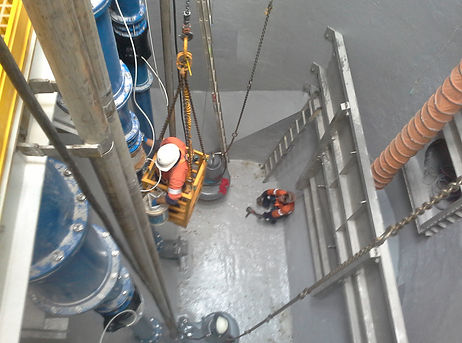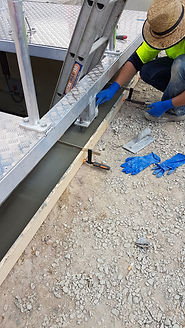Premier Industrial Coatings
-
Surface Preparation
-
Ultra High Pressure Water Blasting
-
Abrasive Blasting
-
Concrete Remediation
-
Protective Coatings
-
Protective Linings

Our Services
Our strength is in our experience based, strategic approach to works planning
Satintouch is engaged for protective coating application services across a diverse range of Infrastructure, Utilities, Mining and Heavy Industry assets for our client partners. From reservoirs, WWTP’s and bridges, to heavy vehicles, manholes and gas pipelines - we are regularly engaged to work in high risk environments and on live assets.

Encapsulation Solutions
Many protective coating projects commence with the development of encapsulation solutions to ensure safe and effective capture of blast material, redundant product (including lead) from existing coatings or linings; fumes and overspray.
Encapsulation solutions may include Engineer Approved scaffolding structures, noise protection, pontoons and traffic control components, which ensure the safety and protection of the environment, the community and our people.
Protective Coatings &
Linings
Satintouch is the Industrial Coatings Applicator of choice for Government, Construction and Mining & Heavy Industry across metropolitan, regional and remote areas of Queensland and Northern NSW.
Commencing operations in 1989, Satintouch has garnered a strong industry reputation for delivering the highest quality protective coating (Epoxy, Polyurea and Polyurethane) application services to major assets across Queensland.



High Pressure Water blasting - or Hydro Blasting is the widespread discharge of high pressure water to remove, mill scale, rust, grease, existing coatings and rubber linings on steel and concrete substrates.
High pressure water blasting is also effective for the cutting of demolition concrete and is an integral preparation process for surface re-coating. Water Blasting may be undertaken as a standalone process; or pre-or post-abrasive blast.
Satintouch has High-Pressure Water Blasting units configured on our Vacuum Trucks, which allows us to provide ferreting services and efficiently extract wet product such as sludge, heavy solids and septic waste without the use of subcontractors.
Abrasive Blasting is the wet or dry, high pressure blasting of abrasive material or ‘blast media’ against a surface in order to remove old surface coatings; shape a surface, smooth a rough surface or conversely, roughen a smooth surface.
Compressed air is used to propel blast media at the surface to remove contaminants and allows for thorough visual inspection of substrate integrity and appropriate remediation if necessary, prior to application of primers and first round of QA Testing.
Satintouch is licensed by Department of Environment and Heritage Protection to undertake Abrasive Blasting activities.
Environmental Authority Number EPPR00633513
17 – Abrasive Blasting and 38 – (1b) Surface Coating >100t but <1000t yr anodising etc


Vacuum Loading is the process used for extracting wet materials (including sludge, heavy solids and septic waste) and dry products (such as garnet, concrete, dirt and other dry deposits). Wet Vacuum Loading is often used as a standalone service for pipe cleaning or ‘ferreting’.
Both wet and dry Vacuum Loading is an important element in the preparation process for surface re-coating, where abrasive or water blasting processes have been undertaken and old product or deposits need to be safely extracted for disposal.
Satintouch is fully compliant with Department of Environment and Heritage Protection legislation and is licensed to transport regulated waste.
Environmental Authority number EPSX01711213
57 – (2b) Regulated waste transport – 6 to 35 vehicles
Remedial concrete structures require abrasive and/or high-pressure water blast to eliminate poor or decayed concrete and achieve a solid, sound, alkaline, clean and prepared substrate.
Subject to deterioration, concrete remediation processes may include concrete grinding, cutting, rendering and crack injections, to ensure complete surface integrity prior to re-coating.
Concrete alkalinity tests are undertaken to ensure parent concrete is ‘alkaline’ and not ‘acidic’, in order to prevent residue sulphide/sulphuric acid, which may cause steel or concrete corrosion.